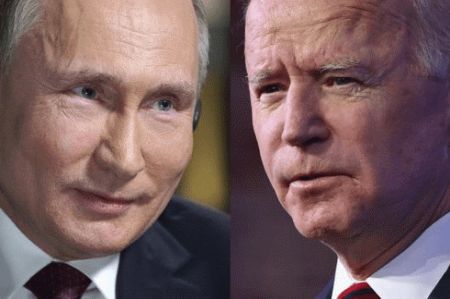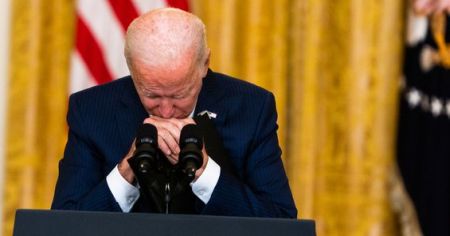Putin is using military force, whereas President Biden is sending the message we're afraid to confront Russia
By Kori Schake
The director of the Central Intelligence Agency conveyed our knowledge of military deployment and our opposition to Moscow. The director of national intelligence shared information with NATO allies. The U.S. Secretary of State warned about Russian disinformation operations. The U.S. Secretary of Defense and the Chairman of the Joint Chiefs of Staff have projected steadiness and readiness, with the Defense Secretary emphasizing that “a move on Ukraine will accomplish the very thing Russia says it does not want — a NATO Alliance strengthened and resolved on its western flank.”
The administration is creatively orchestrating gas supplies to Europe should Russia cut them off.
 NATO also responded strongly, reassuring its frontline states by considering the deployment of additional alliance military forces, and reaffirmed its commitment to including potential new members. Keeping 30 countries together is a huge achievement when President Vladimir Putin of Russia has Ukraine in his cross hairs and is threatening to shoot the hostage unless NATO reverses 30 years of European security.
NATO also responded strongly, reassuring its frontline states by considering the deployment of additional alliance military forces, and reaffirmed its commitment to including potential new members. Keeping 30 countries together is a huge achievement when President Vladimir Putin of Russia has Ukraine in his cross hairs and is threatening to shoot the hostage unless NATO reverses 30 years of European security.Despite these successes, Russia is invading Ukraine. Mr. Putin is using military force, whereas President Biden is sending the message that the United States is afraid of confronting Russia militarily.
Even if the United States is unwilling to fight alongside Ukrainians, it’s a big bargaining advantage for Russia if it’s telegraphing willingness to go to war and we’re ultimately reassuring it that it doesn’t need to worry about us.
The real problem in administration policy is the president.
Even if the United States is unwilling to fight alongside Ukrainians, it’s a big bargaining advantage for Russia if it’s telegraphing willingness to go to war and we’re ultimately reassuring it that it doesn’t need to worry about us.
The real problem in administration policy is the president.
The insular nature of his decision-making, including his reliance on like-minded advisers, lacks rigorous thinking and fuels a kind of arrogance that can lead to unforced errors. His casual suggestion last month that “a minor incursion” by Russia might not draw a tough response required mopping up by the administration. It also drew a bitter rebuke from Ukraine’s president. Most egregiously, Mr. Biden let Russia know it need not fear the prospect of U.S. troops fighting to defend the sovereignty of Ukraine and postwar order, saying publicly that “there is not going to be any American forces moving into Ukraine.”
The most generous interpretation of the president’s actions might be that in a confrontation between two nuclear-armed states, conveying the limits of potential actions could reduce the risk of miscalculation or escalation. And after the humiliating debacle of abandoning Afghanistan, any threat of war made by Mr. Biden would be literally unbelievable — so perhaps the president can console himself that it makes more credible the sanctions and other penalties the West is threatening.
But that’s precisely why the president should instead be re-establishing deterrence damaged by his decisions about Afghanistan. Troop deployments to Poland, Germany and Romania are a good start, but they only convey that the United States will fight to defend existing NATO members, not the rules of order that have stabilized Europe. So Russia knows it won’t confront U.S. forces if it invades Ukraine, and we have effectively conceded to Russia a sphere of influence to prey on countries beyond NATO’s boundary. When Russia invaded Ukraine in 2014 its troops wore no insignia; in 2022 they’re massing in force. This is how an international order crumbles.
Instead of ruling out U.S. military involvement within Ukraine, Mr. Biden could have focused on the fact that the United States and Canada already have forces in Ukraine helping train its military to defend its territory and sovereignty. The United States does not have a large number there — fewer than 200 members of the Florida National Guard — and not a fighting force, nothing that should threaten Russia. Helping countries grow strong enough to defend themselves is in America’s interests. A fundamental principle in Europe since the end of World War II has been that borders change by peaceful negotiation, not force. That has made Europe peaceful and allowed it to grow incredibly prosperous — and helped the United States be safe and prosperous, too.
 In addition to undercutting deterrence, the president missed an important opportunity to help Americans understand why we should care about what happens in Ukraine.
In addition to undercutting deterrence, the president missed an important opportunity to help Americans understand why we should care about what happens in Ukraine.Mr. Biden should also be preparing the American people and U.S. allies for the sacrifices that everyone is likely to endure if Russia attacks Ukraine. There would be a greater risk of war spilling over into NATO allies, which the United States has solemn obligations to defend. The United States would most likely have to spend more on defense if Russia shows that the peaceful rules no longer apply.
There would probably be millions of Ukrainians fleeing the war who will need refuge. In the United States, we would probably see more expensive gas at the pump because Russia can affect oil prices. We’d most likely see even a higher risk of Russian disinformation campaigns. And we might also have to deal with an even stronger Russia-and-China alliance to thwart American interests around the world. These are all unwelcome developments, which is especially why Mr. Biden needs to bring the public along to support them.
The world is growing more dangerous for American interests. That’s not Mr. Biden’s fault — it’s Vladimir Putin’s and Xi Jinping of China’s fault. They are the ones threatening their neighbors. But Mr. Biden isn’t adequately explaining to Americans what’s happening, why we should care or what we should do about it.
The mistakes of the Biden administration on national security policy have not been mistakes of interagency coordination or errant cabinet members. They have largely been mistakes of the president’s own making: loudly proclaiming to “put human rights back at the center of our foreign policy” without actually doing so, linking “foreign policy for the middle class” with trade protectionism, failing to establish an effective international economic policy that helps reduce reliance on China and, most awfully, the decisions about Afghanistan.
My belief is that Mr. Biden’s troubles stem from arrogance that he’s right — has always been right — on issues where his recommended policies were not adopted when he was a senator or the vice president, specifically when it came to decisions over the wars in Iraq and Afghanistan.
Instead of appointing a strong, independent national security team, he has often appointed subordinates as well as officials who were veterans of the Obama administration, people who either agree with his perspective or defer to it. And when the Secretary of Defense and chairman of the Joint Chiefs of Staff attempted to alter his decision to withdraw from Afghanistan, they were unsuccessful.
The lack of many new perspectives within the administration not only leaves the president bereft of rigor in internal policy debates; it also means the administration isn’t prepared for inevitable criticism. This was seen when the State Department spokesman was clearly annoyed when a journalist pressed him for more information about its assertions about a Russian false flag operation and when the White House press secretary accused a senator of “parroting Russian talking points.” A better president would appreciate that policies are robust only when you win the political argument, not when you organize your administration to avoid them.
Authoritarian states are brittle because their leaders surround themselves with people who won’t or can’t challenge mistakes. Free societies can be slow to adopt policies but more durable in the conduct of them even when they’re costly because leaders have to win the political argument and gain support. President Biden’s choices are reducing the resilience of U.S. policy by indulging his preferences rather than building broader support for difficult things these times require of us.
We should be grateful President Biden is in office during this crisis rather than President Trump, with his erratic belligerence and admiration for authoritarians that characterized his policies.
 And yet, we are likelier to avoid war with Russia by backing up our diplomacy with military might that strengthens deterrence than by telegraphing to our adversary what we are afraid of. President Biden needs to up his game.
And yet, we are likelier to avoid war with Russia by backing up our diplomacy with military might that strengthens deterrence than by telegraphing to our adversary what we are afraid of. President Biden needs to up his game.Kori Schake is a Senior Fellow and Director of Foreign & Defense Policy Studies at the American Enterprise insitutue.
























